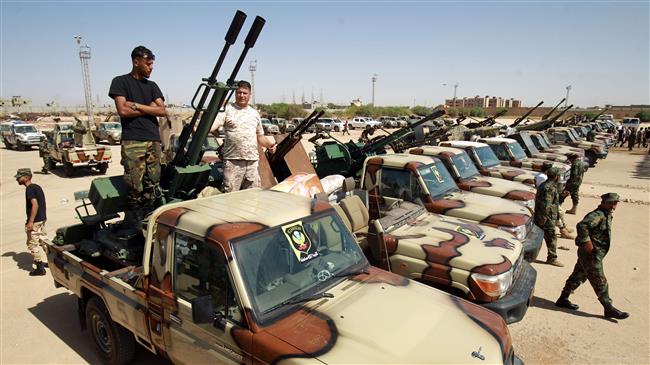France, Germany, Italy threaten sanctions on violators of Libya’s arms embargo
France, Germany and Italy have threatened to impose sanctions against countries that are violating a United Nations (UN) arms embargo on conflict-torn Libya.
In a joint statement after a meeting in Brussels on Saturday, French President Emmanuel Macron, German Chancellor Angela Merkel and Italian Prime Minister Giuseppe Conte called on “all foreign actors to end their increasing interference and to fully respect the arms embargo established by the United Nations Security Council” on the African country.
“We are ready to consider the possible use of sanctions if the breaches of the embargo at sea, on land or in the air continue, and look forward to the proposals that the High Representative of the European Union for foreign affairs and security policy will make in this regard,” they said.
The three European leaders also expressed “serious concerns” over the rising tensions in Libya and urged an immediate cessation of hostilities in the oil-rich country.
“We share serious concerns about the mounting military tensions in this country and the increased risk of regional escalation,” they said. “We therefore call on all the Libyan parties and their foreign supporters to immediately cease the fighting and put an end to the ongoing military escalation across the country."
Earlier in the month, UN Secretary-General Antonio Guterres warned that foreign interference in the Libya conflict had reached “unprecedented” levels.
Guterres underlined that both the delivery of weapons and the dispatch of proxy forces were in violation of a UN arms embargo on Libya.
Libya has been in chaos since 2011, when a popular uprising and a NATO intervention led to the ouster of long-time dictator Muammar Gaddafi.
Since 2014, two rival seats of power have emerged, namely the internationally-recognized Libyan government, headed by Prime Minister Fayez al-Sarraj in Tripoli, and another group, based in the eastern city of Tobruk, supported militarily by rebels under the command of Khalifa Haftar.
Haftar’s rebel forces — who are militarily backed by the UAE, Russia, and Egypt — launched an offensive to seize the capital and unseat Sarraj’s government in April 2019, triggering some of the most intense fighting in the country.
The government in Tripoli launched a counter-offensive against Haftar-led rebels and has recently managed to reverse many of their gains with Turkey's help.
The Turkish military has been providing air cover, weapons and allied militants from Syria to help Tripoli repel the assault.
On the other camp, Haftar has been receiving advanced weapons systems from the UAE, one of his major supporters in the offensive on Tripoli.
Egypt has also used its vast border with Libya to funnel weapons and provide logistical support to Haftar, according to reports.
In turn, France, along with a number of Western states, has been lending political support to the Libyan rebel commander and his militias. There are concerns that Paris is also providing Haftar with military support.
Numerous reports have suggested that Haftar and his forces have used weapons and other military equipment made by France, Germany and Russia in the course of their operations.
Libyan army dispatches forces eastward
On Saturday, forces of Libya’s UN-backed government moved closer to the strategic cities of Sirte and Jufra, which are regarded as a gateway to the country’s main oil terminals occupied by Haftar’s rebels.
Local media said a column of about 200 vehicles moved eastwards from the northern city of Misrata along the Mediterranean coast towards the town of Tawergha, located about 200 kilometers away from Sirte.
“As part of our preparations to complete the second stage of liberating Sirte and Jufra region, our forces are preparing for this stage and these troops are part of the forces as you see now. They are getting ready to go to the fighting points and you will hear the good news in the upcoming days,” said Colonel Omar bin Rashed, a military commander with the Libyan army.
The Libyan government forces said they were determined to recapture Sirte and an airbase at Jufra from Haftar’s rebels.
Israel indicts two settlers over suspected spying for Hezbollah
Iran: US airstrikes on Yemen war crimes, violation of international law
Yemeni armed forces down F-18 fighter jet, repel US-UK attack: Spokesman
Iran warns against US-Israeli plot to weaken Muslims, dominate region
VIDEO | Public uproar in US against Israeli regime
‘Ghost town’: 70% of Jabalia buildings destroyed by Israel
Mother’s Day: Sareh Javanmardi’s inspiring journey as Paralympic champion and mother
Russia downs over 40 Ukrainian drones as Putin vows 'destruction' on Kiev













 This makes it easy to access the Press TV website
This makes it easy to access the Press TV website